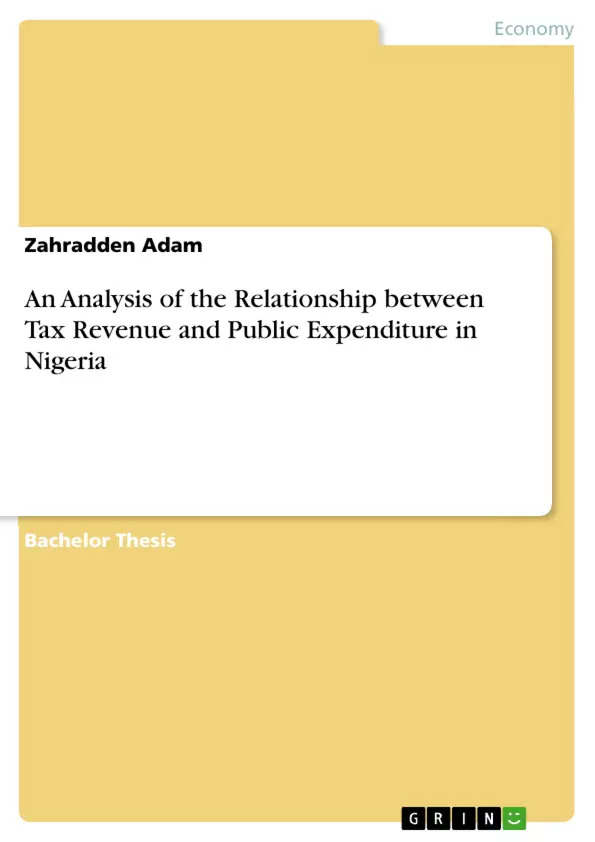The study investigatedon the relationship between tax revenue and public expenditure in Nigeria for the period of 1985-2017. To achieve the objective of the study, relevant secondary data were collected from the Central Bank of Nigeria (CBN) Statistical Bulletin. The study set out to test both long run and causal relationship between tax revenue and public expenditure in Nigeria. An empirical investigation was conducted using time-series data on oil revenue, non-oil revenue and capital expenditure from 1985-2017. The technique employed in the study include were Augmented Dickey Fuller test, Johasen Co-integration test, Vector Error Correction Model, Granger Causality test, and diagnostic test. The results shows a significant long-run relationship and a uni-directional relationship between tax revenue and public expenditure in Nigeria.The study recommends that Government should endeavor to provide social amenities to all nooks and crannies of the country as this will boost the level of tax compliance in Nigeria.
Table of Contents
- Chapter One: Introduction
- Chapter Two: Literature Review
- Chapter Three: Research Methodology
- Chapter Four: Data Analysis and Results
- Chapter Five: Conclusion and Recommendations
Objectives and Key Themes
This research project analyzes the relationship between tax revenue and public expenditure in Nigeria from 1985 to 2017. The study aims to determine the long-run relationship and causal link between these two economic variables. It utilizes time-series data and econometric techniques to achieve its objectives.
- The relationship between tax revenue and public expenditure in Nigeria.
- The impact of tax revenue on public expenditure.
- The role of taxation in economic development.
- Econometric analysis of time-series data.
- Policy recommendations for improving tax revenue and public expenditure management.
Chapter Summaries
Chapter One: Introduction: This introductory chapter sets the stage for the research by establishing the significance of tax revenue and public expenditure in the context of government fiscal policy. It provides a brief overview of the historical context of taxation in Nigeria, highlighting its evolution from traditional forms of community service to the modern income tax system introduced during the colonial era. The chapter emphasizes the crucial role of tax revenue as a primary source of government funding for essential public services and economic development initiatives. It introduces the research problem and outlines the study's objectives, methodology, and scope, positioning the research within the broader field of public finance and economic policy in Nigeria.
Chapter Two: Literature Review: [This section would contain a summary of existing literature on the relationship between tax revenue and public expenditure. It would synthesize various academic perspectives and empirical findings to provide a context for the current study. The summary would discuss theoretical frameworks and previous research on the subject, highlighting key debates and controversies.]
Chapter Three: Research Methodology: [This section would describe the research design, data sources, and econometric techniques used in the study. It would explain the selection of the time period, the variables included in the analysis, and the justification for the chosen statistical methods. The summary would also address any limitations of the methodology and potential biases.]
Chapter Four: Data Analysis and Results: [This section would summarize the key findings of the econometric analysis, including the results of tests for co-integration, causality, and other relevant statistical measures. It would present the empirical evidence regarding the relationship between tax revenue and public expenditure. The summary would highlight any significant relationships or patterns observed in the data.]
Keywords
Tax revenue, public expenditure, Nigeria, fiscal policy, econometrics, time-series analysis, government spending, taxation, economic development, public finance.
Frequently Asked Questions: A Comprehensive Language Preview
What is the main topic of this research project?
This research project analyzes the relationship between tax revenue and public expenditure in Nigeria from 1985 to 2017. The study aims to determine the long-run relationship and causal link between these two economic variables using time-series data and econometric techniques.
What are the key objectives of the study?
The study's objectives include determining the relationship between tax revenue and public expenditure in Nigeria, assessing the impact of tax revenue on public expenditure, examining the role of taxation in economic development, conducting econometric analysis of time-series data, and offering policy recommendations for improving tax revenue and public expenditure management.
What is included in the Table of Contents?
The Table of Contents includes: Chapter One: Introduction; Chapter Two: Literature Review; Chapter Three: Research Methodology; Chapter Four: Data Analysis and Results; and Chapter Five: Conclusion and Recommendations.
What does Chapter One cover?
Chapter One introduces the research, emphasizing the significance of tax revenue and public expenditure in Nigerian government fiscal policy. It provides historical context of taxation in Nigeria, outlines the research problem and objectives, methodology, and scope, positioning the research within public finance and economic policy in Nigeria.
What is covered in Chapter Two (Literature Review)?
Chapter Two summarizes existing literature on the relationship between tax revenue and public expenditure, synthesizing academic perspectives and empirical findings to provide context for the current study. It discusses theoretical frameworks and previous research, highlighting key debates and controversies.
What methodology is described in Chapter Three?
Chapter Three details the research design, data sources, and econometric techniques used. It explains the selection of the time period, variables, and statistical methods, addressing any methodological limitations and potential biases.
What are the key findings presented in Chapter Four?
Chapter Four summarizes the key findings of the econometric analysis, including results of tests for co-integration and causality. It presents empirical evidence regarding the relationship between tax revenue and public expenditure, highlighting significant relationships or patterns.
What are the key words associated with this research?
Key words include: Tax revenue, public expenditure, Nigeria, fiscal policy, econometrics, time-series analysis, government spending, taxation, economic development, and public finance.
- Citar trabajo
- Zahradden Adam (Autor), 2019, An Analysis of the Relationship between Tax Revenue and Public Expenditure in Nigeria, Múnich, GRIN Verlag, https://www.grin.com/document/506980



